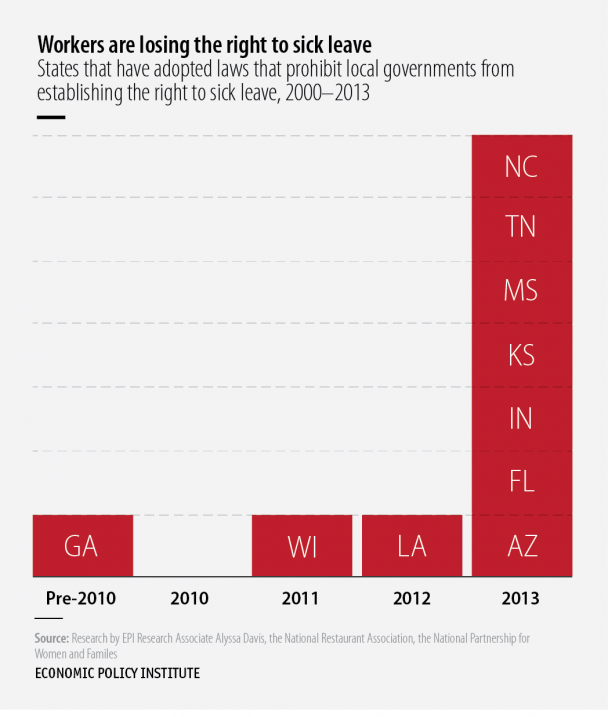Among the fifteen most competitive countries, the United States is the only one that doesn’t guarantee that all workers have access to paid time off when they or their family members fall sick. So some states and cities have addressed the problem on their own by passing laws that require employers to offer paid sick days to all employees. There are seven such laws on the books right now: in Jersey City; New York City; Portland, Oregon; San Francisco; Seattle; Washington, DC; and the state of Connecticut. Three of those laws—Portland, New York and Jersey City—happened this year.
The movement is experiencing a good deal of momentum, with current fights for these policies being waged in Newark, New Jersey; Tacoma, Washington; Massachusetts; New Jersey; and Vermont. Advocates are also pushing for an expansion of DC’s law to cover tipped workers, and Mayor-elect Bill de Blasio may look to expand New York City’s law to cover more workers.
But what some progressive fans of this movement might not realize is that there is a well-funded wave of opposition that, by the raw numbers, has experienced more success. So-called “pre-emption” state laws that block cities and counties from passing paid sick leave bills have now been enacted in ten states, with seven this year alone, according to analysis from the Economic Policy Institute:

As the report notes, this effort is fueled with support, and money, from enormous business interest groups. “In each of the ten states, the bills’ sponsors included members of the American Legislative Exchange Council (ALEC),” it notes. “And in each case, the bills were adopted following vigorous advocacy by corporate lobbies such as the Chamber of Commerce, National Federation of Independent Business, and Restaurant Association.” For instance, Florida’s bill was pushed forcefully by Disney World, Darden Restaurants (owner of Olive Garden and Red Lobster), and the Florida Chamber of Commerce. ALEC handed out model pre-emption legislation to conservative legislators at a national meeting in 2011.
More may be on the way. A lawmaker has just introduced such a bill in the Pennsylvania state legislature and have been introduced in at least fourteen other states.
But these numbers don’t mean that advocates of paid sick days are feeling beat. While Vicki Shabo, director of work and family programs at the National Partnership for Women & Families, told me legislative fixes in the states with pre-emption laws may be difficult, one possibility—which would take serious resources—would be to take the issue to the voters through ballot initiatives. Ellen Bravo, executive director of Family Values @ Work, said her organization is also reaching out to local officials to have them speak with their colleagues about “the principle of democracy and local control,” since these laws take power away from local governments. “Coalition members find allies who are experts in good government and circulate commentaries from conservatives who say, we may not like paid sick days, but you can’t support the concept of local control only when you agree with the outcome,” Bravo said. And both said they are shining a light on the big business interests behind these laws that “would rather deal with lowest common denominator,” as Shabo put it.
But even the targeted action against the paid sick days movement may have a silver lining. The pre-emption approach has been deployed by business interests to combat issues from smoking ordinances to gun laws to domestic violence protections to environmental protection. “It’s a testament to the success of the paid sick days movement that we’re now being targeted,” Shabo said. Not to mention the success of paid sick days, usually pushed by organizations that are staffed by volunteers and can’t hire lobbyists, has been in the face of vast sums of money on the other side.
And with each victory comes a new opportunity to prove that these laws are actually beneficial to businesses. The expansion of DC’s law alone is estimated to net employers $2 million in savings even with any costs taken into account. Seattle’s job growth and business growth have been strong under its law, and job growth has actually been stronger. San Francisco has also seen strong job growth and the law enjoys business support. The policies in DC and Connecticut have proven to come with few costs for businesses.
On the other hand, the average employer loses $225 per worker each year due to lost productivity when employees get sick and don’t have access to paid leave. Perhaps with time more businesses will champion the cause.
There’s another “cliff” at the end of the year, George Zornick writes. Going over would devastate America’s long-term unemployed.


